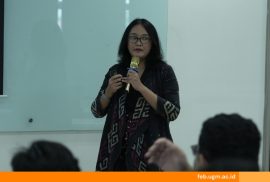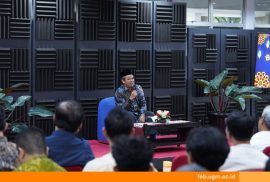On Tuesday (8/6), the Master of Accounting Study Program, Faculty of Economics and Business, University of Gadjah Mada (MAKSI FEB UGM) in collaboration with the Supreme Audit Board of the Republic of Indonesia (BPK RI) held a Public Lecture with the theme “Investigative Examination Methodology”. Public lectures are held online through the Zoom Meetings platform. This event was moderated by Singgih Wijayana, M.Sc., Ph.D., Head of the Accounting Department, Faculty of Economics and Business UGM. The resource persons for this public lecture are Dr. Agus Joko Pramono, M.Acc., Ak., CA., CPA., CSFA., CFrA. As Deputy Chairperson of BPK RI, and Dr. Heri Subowo as Auditor of BPK RI.
Eko Suwardi, M.Sc., Ph.D., Dean of FEB UGM, delivered his opening remarks to start this public lecture. “This public lecture is very important for all of us, especially the accounting profession because the speakers in this public lecture are very qualified in their fields. It is important (also) for students in college to know how the practice conditions are. On behalf of the community of FEB UGM and MAKSI FEB UGM, we would like to thank Mr. Agus Joko Pramono and BPK RI. Welcome to a very useful lecture on investigative examination methods, especially in the public sector in Indonesia,” said Eko.
The first session of the public lecture was the presentation of the Investigative Examination Methodology by Dr. Agus Joko Pramono. Agus said that there are three scopes of state financial audits.
“The scope of examination used to examine state finances is opinion, performance which will provide recommendations regarding audit results to auditees, as well as examination of certain objectives, one of which is investigative examination. The investigative examination itself is used to explore something, calculate state financial losses, and as expert testimony in court,” said Agus.
According to him, the investigation examination consists of four stages, namely pre-planning, planning, implementation, and reporting. The pre-planning stage starts from understanding the scope of the investigation process, and trying to uncover what irregularities have occurred in the context of state finances. Next, how the investigative examination will be carried out.
“It is necessary to prepare sufficient predication through internal and external information such as law enforcement officers and non-law enforcement officers. The goal is to determine a strong predication because many hoax issues are not based on a sufficient basis, so a cross check or verification process must be carried out to validate the accuracy of the information,” said Agus.
Next, the planning stage is carried out in the form of reviewing initial information. If it is felt that there are symptoms, information and at least 4W + 1H (What, Who, Where, When, How) elements are sufficient, then the inspection stage can enter the planning stage by making an audit program to start the investigation. Agus explained that in the audit preparation stage, this program will determine the direction, objectives, scope, and develop hypotheses by making audit procedures.
“From this hypothesis, temporary conclusions will be found based on the results of the study and the relationship of the existing variables,” said Agus.
“The most crucial stage in conducting an investigative audit is the planning stage, because this stage reconstructs quite a lot of time and effort, especially when there is a shift in predication,” he added.
After that, the examination program diagram is drawn up which outlines the internal control procedures that contain procedures such as the legal basis for the audit, audit standards, the purpose and scope of the audit, the audited entity, the composition of the team and the audit fee to the time of submission and distribution of the Audit Results Report (LHP). According to Agus, the purpose of this stage is to determine the examination steps in order to prove the hypothesis. The next stage is the implementation stage which is the execution of the planning stage which aims to collect evidence that an unlawful act occurred.
“The implementation phase begins with gathering evidence based on facts through interviews, or analysis of available documents. Followed by evaluation of evidence, and drafted conclusions with the relevant parties. Examiners use evidence to build the disclosure of a fraud case that occurred,” he explained.
Agus explained about the evidence used in the examination, including witness statements, expert statements, letters or documents, as well as statements from the defendant. According to Agus, there are several techniques that can be used to collect evidence.
“Evidence collection techniques used in the examination include vouching, observation by visiting the field, confirmation, physical checks, inquiries, analytical procedures, benchmarking, FGD, to the use of experts and digital forensics”, he explained.
After the evidence collection stage, according to Agus, the next stage is the technique of evaluating evidence carried out by analyzing evidence, checking the relevance of evidence, and verifying evidence, evaluating evidence, proving the hypothesis to the professional judgment stage to determine the examiner’s ability to evaluate the situation, whether this evidence is engineered or not. to determine the quality of the evidence. After analyzing the evidence, the examiner drafts a conclusion concept that may or may not support the examination which includes elements of 5W+2H(What, Who, Where, When, Why, How, How Much).
“This concept was discussed with Law Enforcement Officials (APH) whether it fulfills the concept of deviation and the results of the discussion,” he explained.
Agus explained that the last stage is reporting, which according to him, this stage is the stage of preparing the Examination Results Report (LHP), a written document of conclusions on the results of the investigative examination which contains the preparation of the Concept of Examination Results (KHP) and finalization of conclusions.
The next session was the presentation of material by Dr. Heri Subowo who explained the examples of cases in the Investigative Examination methodology regarding how to calculate state losses using an investigative examination within the professional framework developed by BPK RI, starting with reviewing initial information on an investigative audit request, calculating state losses by preparing the pre-planning stage to the reporting stage and preparation of LHP, which contains information on state losses, and the stages of preparation to reporting on the Provision of Expert Information.
Reportage: Sony Budiarso/Kirana Lalita Pristy




